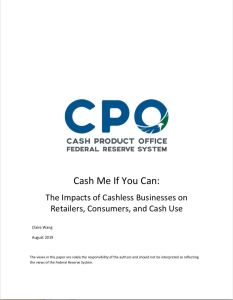Join getAbstract to access the summary!

Join getAbstract to access the summary!
Claire Wang
Cash Me If You Can
The Impacts of Cashless Businesses on Retailers, Consumers, and Cash Use
FRBSF, 2019
What's inside?
Is cash still king in the United States, or will the king soon be deposed?
Recommendation
A number of businesses in the United States are seeing the benefits of refusing to accept cash payments. However, downsides to a cashless economy abound, particularly for consumers, many of whom continue to prefer paying in the traditional way. This broad but enlightening paper from Federal Reserve policy expert Claire Wang examines the pros and cons to both businesses and individuals of going cashless. Her findings will intrigue economists, executives and consumers.
Summary
About the Author
Claire Wang is a policy analyst for the Federal Reserve System’s Cash Product Office.
















Comment on this summary